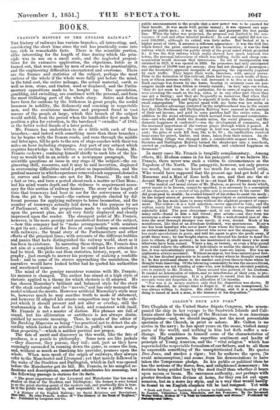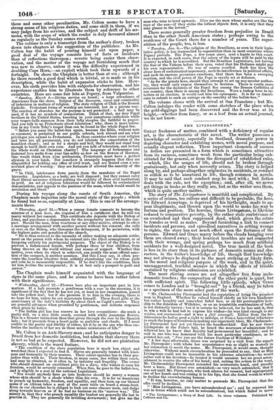COLTD/e-S DECK AND TORT. * THE Chaplain of the United States
frigate 'Congress, who Room- panied the ship in her voyage to the Sandwich Islands and CaE- fornia about the breaking out of the Mexican war, is an Azneziaan Episcopalian—and, we should imagine, aot the most presentable specimen of the Church, in print or ashore. Mr. 'Oolton is no novice in the he has spent years on the ocean, visited many parts of the world, and nothing in him but doth suftbr a sea- change. He combines in himself some of the characteristics of the old English parson, the superfine sentiment and laxity Of principle of Young America, and the " vital religion " which has superseded the respectable formalism ofour fathers, and to all these he superadds something of the unsophisticated Tack. He quotes Don Juan, and smokes a cigar; but he eschews the opera, ;(to avoid anisconception,)and seems from his denunciations to have taken the Temperance pledge. In his public or political ideas Its has the notions of the fierce, free, -and enlightened 'democracy; his decision being guided less by the deed itself than -whether it bears upon meum or tutun. He canvasses authority, not perhaps with greater -freedom than divines at home, for they can let out uuppon occasion, but in a more lay style, and in a way that would hardly be found in :an English Chaplain till he had resigned. Yet with Deck and Port; or Incidents of a Cruise to California. With Sketches of Rio de Janeiro, Valparaiso, Lima, Honolulu, and San Francisco. Hy the Reverend Walter Ooltcm, Author ef'"A. Vlidt Wotreennittneple Arid Athensr` Publibhat by Pettsidgelaid Ovikey.
these and some other peculiarities, Mr. Colton seems to have a strong sense of his religious duties, and some skill in them, if we may judge from his services, and the subject and drift of his ser- mons, with the scope of which the reader is duly favoured almost as regularly as the Sunday comes round. The volume is only a transcript from the author's diary, broken down into chapters at the suggestion of the publisher. As Mr. Colton has the habit of pouring himself out upon. paper, a good deal of the voyage consists less of facts or incidents than of reflections thereupon ; reverie being easier than obser- vation, and the matter of the voyage not furnishing much that was new to observe, unless it was the difficulty experienced in doubling Cape Horn,—an exploit which took them upwards of a fortnight. On shore the Chaplain is better than at sea ; although he there records a good deal which is trivial, or is made so in his description, while the habit of expansion sticks to him. How- ever, his cloth provides him with subjects for observation, and his experience enables him to illustrate them by reference to other countries. Here are some fair hits at Popery, from Valparaiso.
"Sunday, March 8.—Divine service on board ; a large attendance of Americans from the shore. Subject of the discourse, cause and criminality of indecision in matters of religion. The state religion of Chili is the Roman Catholic. Protestant forms of worship are tolerated, but in a private way. The erection of churches for the purpose is not permitted : a hall may be used, if it has no symbols of consecration. Think of that, my dear Papal brothers in the United States, kneeling in your sumptuous cathedrals while your vesper-bells summon from their lofty steeples the faithful to prayer. .And you talk to us Protestants about toleration! why, there is more tolera- tion in my Uncle Toby's teapot than can be found in the whole Papal See. " Before you assay the ballot-box again, because the Bible, without note or comment, is permitted in our public schools, look abroad and see what privileges you extend to Protestants. In those countries where your religion and 'laws are all paramount, you do not tolerate the consecration of the humblest chapel ; and as for a steeple and be they would not stand long enough to knell their own ruin. And yet you talk of toleration and lecture the whole world on Christian charity ! The language of forbearance and fraternal love melts from your lips softly as dew on the flowers of Hermon. One would think from your professions, Protestants must have a perfect elysium in your lands. But somehow it strangely happens that they are disqualified for holding any office of civil trust, and are denied even a con- secrated place of worship : they are fortunate if allowed the sanctity of the grave. " In Chili, intolerance flows purely from the mandates of the Papal hierarchy. Legislators, as a body, are well disposed ; but they cannot carry their liberal measures without putting the stability of their civil institutions in peril. An act of religions toleration would be followed by ecclesiastical denunciations, and appeals to the passions of the mass, which would result in revolution and blood."
During his voyage along the coasts of South America, the Chaplain made inquiries into the moral state of the people ; which he found but so-so, especially at Lima. This is one of the arrange- ments there.
"Thursday, April 23.—When is-yonng female consents to become the mistress of a man here, she requires of him a certificate that he will not
marry without her consent. This certificate she deposits with the Bishop of Lima, and purchases a dispensation for the irregularity involved in the con- pact. Should the man, from weariness or any other motive, attempt to effect a marriage arrangement with another person without her consent, she calls at once on the Bishop, who threatens the delinquent, if he perseveres, with the highest pains and penalties of the church.
" He is thus reduced to the necessity of either making an adequate settle- ment on the person with whom he entered into the illicit arrangement, or of foregoing entirely his matrimonial purposes. The object of the Bishop is to prevent a dishonoured female, with perhaps three or four children, from being thrown on the world without any means of support. Whether this motive, even when its object is aehieved, canjustify the semi-official sanc- tion of the compact, is another question. But this I may say, it often pre- vents the heartless libertine from selfishly abandoning one for whose guilt and ruin he is measurably responsible. If he don't like the conditions, then let him decline the arrangement ; it is at best only a passport to guilt and
sorrow."
the Chaplain made himself acquainted with the language of signs in the same place, and he seems to have been rather taken with their significance.
" Wednesday, April 22.—Flowers here play an important part in love matters. If a lady presents a gentleman with a rose in the morning, it is significant of the fact that he has not yet, at least in her imagination, passed into the yellow leaf; but if she present's it to him in the evening, there is no hope for him, unless he can rejuvenate himself. These floral gifts at the anniversary of the lady's birthday fly about thick as Cupid's arrows. They are graceful advances when presented by gentlemen, and delicate responses when given by ladies. " The Indian girl has less reserve in her love recognitions : she sends a pretty doll, on a nice little couch, covered with white jessamine flowers. This is a broader intimation than that given through the rose by the Spanish lady ; but it proceeds from a heart quite as guileless and chaste. If I must confide in the purity and fidelity of either, let it be in the one who thus em- bodies the instincts of her sex in these mimic miniatures of life."
Mr. Colton is an Anti-Slavery-man; and he anticipates danger to Brazil from her domestic institution, but admits that slavery there is not so bad as he expected. However, he did not see plantation slavery, which is the worst feature.
"The condition of the slave population here is much less abject and wretched than I expected to find it. Slaves are generally treated with kind- ness and humanity by their masters. Their colour operates less to their pre- judice than with us. Their freedom, in many cases, lies within their reach, and may be obtained, as it often is, by industry and frugality. The owner who should demand an exorbitant price for a slave, who wishes to earn his freedom, would be severely censured. When free, he goes to the ballot-box, and is eligible to a seat in the national Legislature. "Nor would anybody here go into hysterics should he marry a woman whose skin should be a shade whiter than his own. It is for us Americans to preach up humanity, freedom, and equality, and then turn up our blessed noses if an African takes a seat at the same table on board a steam-boat. Even in our churches he is obliged to look out some obscure nook, and dodge along towards heaven as if he had no business on the 'narrow way.' The misery is, that they who preach equality the loudest are generally the last to practise it. They are generally for levelling downwards ; but give me the man who tries to level upwards. Give me the man whose smiles are like the rays of the sun—if they strike the loftiest objects first, it is only that they may glance to the lowest."
There seems generally greater freedom from prejudice in Brazil than in the other South American states ; perhaps owing to the residence of the Court there for a number of years. The super- stition of the people, too, is less.
"Tuesday, Jan. 6.—The religion of the Brazilians, as seen in their legis- lative policy, is less trammelled by superstition than in most countries where Papacy prevails. The Pope, a few years since, sent a legate to this court. It is expected, in such cases, that the salary of the legate will be paid by the country to which he is accredited. But the Brazilian Legislature, not having the fear of the Vatican before their eyes, voted that his Holiness might pay his own representative. He was of course recalled. Such has been the abuse here of ecclesiastical supremacy, such its interference in political affairs, and such its onerous pecuniary exactions, that there has been a sweeping reaction, and the civil power of the Pope is openly set at defiance.
"As for the priests here, should they attempt to set up any secular author- ity, they would only expose themselves to derision. There is vastly more reverence for the decisions of the Papal See among the Roman Catholics of our country, than there is among the Brazilians. Were a bishop here to in- terfere at an election, it would cost him his episcopate. It is for us Ameri- cans to submit to such an outrage on the sanctity of the ballot-box."
The volume closes with the arrival at San Francisco ; but Mr. Colton indulges the reader with some sketches of the place when the gold-diggings had been discovered and the fever was at its height,—whether from fancy, or as a leaf from an actual journal, we do not know.



























 Previous page
Previous page